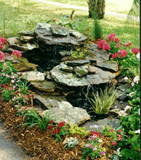These are spitters. Spitters are statues that are plumbed to allow water to be pumped through them. Thousands of kinds of spitters are made, from little boys peeing to little girls with umbrellas or huge bronze birds or dolphins costing thousands of dollars.
One of my crane spitters' neck is broken. That may or may not have been an accident
I have these two little cranes because some client didn't want them anymore, so gave them to me. Notice they are NOT hooked up to a pump with water spitting out of their beaks. In fact, they are not in the water. They live on the banks of the pond and will never been seen with water shooting out of their beaks unless it's raining hard.
You ask why? If you have spitters, you don't have to ask. You already learned why.
You see, it all starts with the spitters looking all cute sitting on the side of the pond or even in the water. Water is shooting out of the intended orifice and all is well.
As time passes, and not all that much time, the pump picks up some pond debris and water is now slowing down. It's now drooling out and down the spitter's body. Two things happen when the drool begins. Water does not return to the pond and drools out. And the spitter is wet where the water drools and soon turns black with algae. Both things are disasters.
If the spitter is in the water, the pump is grinding away uselessly working its hardest to burn up because it's clogged up with pond debris. And it will burn up, trust me.
If the spitter is next to the pond, the spitter is drooling water out of the pond, albeit slowly. It only takes overnight or so to totally drain the pond. There is no such thing as a little leak.
My advice: Stay away from spitters. Or get them and use them as an ornament, never letting their tails, feet or anything else get hooked up to a pump. They will make your hair grey.
For tips like this and much more, download "A Practical Guide to Building and Maintaining your Pond" here
And join us at pondlady.com to ask questions and share your pond knowledge with others. Click here

